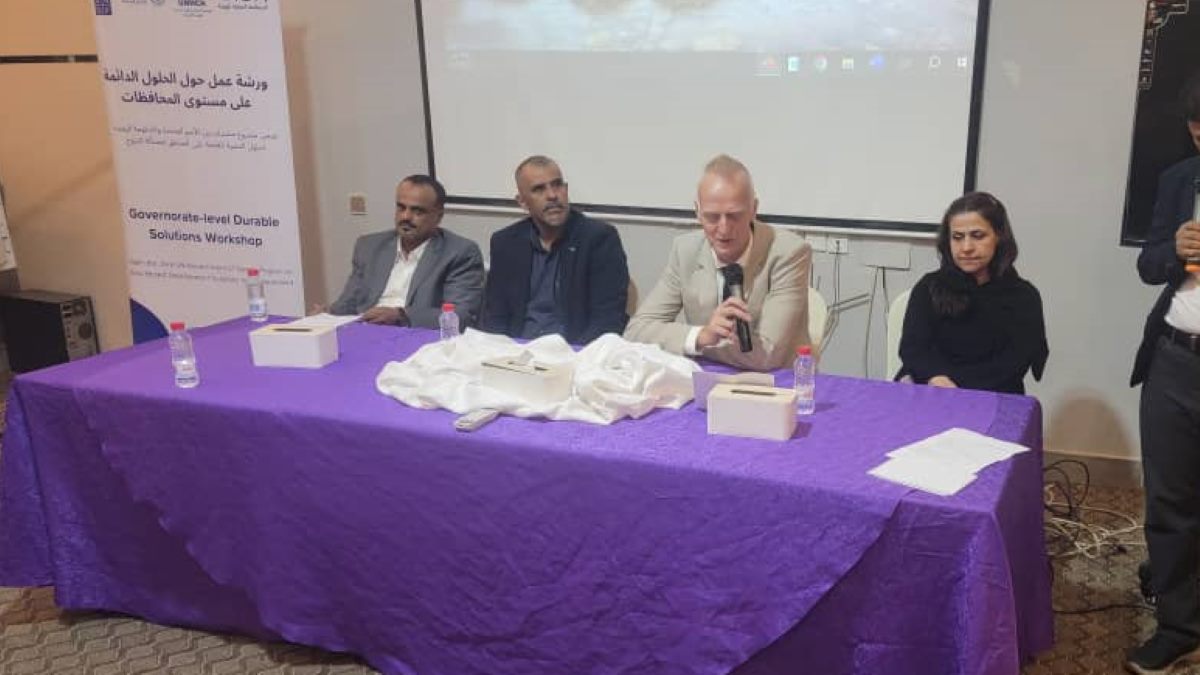Aden: Third and Final Workshop on Durable Solutions for Internal Displacement

The city of Aden on Sunday hosted the third and final workshop on sustainable solutions at the governorate level, as part of a joint project between the Yemeni government and United Nations agencies, funded by the Internal Displacement Solutions Fund. The workshop aims to promote sustainable local development and address displacement challenges.
The workshop, which brings together representatives from government bodies, local authorities, and international and humanitarian organizations, seeks to finalize mapping tools, identify priority areas, and approve a local action plan for durable solutions that integrate humanitarian needs with long-term development programs.
During the opening session, Aden Deputy Governor Awad Mubjer praised the efforts of the United Nations and development partners in supporting local authorities to find practical and sustainable solutions to the suffering of displaced people. He reaffirmed the local authority’s commitment to providing all necessary facilities to ensure the success of joint programs and projects.
For his part, Dr. Mohammed Nasser Al-Soufi, Director-General of the Executive Unit for IDP Camp Management, welcomed the local authority’s leadership sponsoring the workshop—particularly the leadership of the Southern Transitional Council and the Minister of State, Governor of the capital Aden. He also welcomed all participants, expressing appreciation for the strong support provided by Presidential Leadership Council member Major General Aidarous Al-Zubaidi for displacement-related issues in Aden. Al-Soufi stressed that these efforts represent a concrete step toward achieving stability and comprehensive development.
In his remarks, Al-Soufi called on all UN and international organizations to unify efforts and mobilize sufficient support to rehabilitate Aden’s infrastructure and advance the city’s future—especially in the development sector. He noted that Aden currently bears the largest burden of displaced persons and returnees, in addition to thousands of irregular migrants. He added that the recent damage caused by heavy rainfall and its aftermath underscores the urgent need for exceptional support, urging remaining organizations to relocate their main offices to the capital, Aden.
Al-Soufi emphasized that Aden has become a safe haven for everyone, explaining that this workshop serves as a continuation and conclusion of previous sessions. It aims to review development plans addressing the needs of targeted districts in Aden Governorate, which were presented in the previous workshop, to be endorsed and submitted to donors for mobilizing support and meeting humanitarian needs.
In conclusion, Al-Soufi extended his gratitude and appreciation to the participating and supporting UN agencies and organizations, particularly the United Nations Development Programme (UNDP)—the project’s coordinating agency—as well as to the local authorities in Aden and all attendees.
The UNDP representative noted that addressing internal displacement is not merely a humanitarian issue, but a development and peacebuilding priority. He reaffirmed the commitment of UN offices and NGOs—through partnership between UN agencies and the Yemeni government—to advance the durable solutions agenda in line with the Sustainable Development Goals, and to continue UN support for lasting solutions in Aden and across Yemen.
The workshop includes discussions on an actionable local work plan for Aden Governorate, mechanisms for reviewing and improving current planning tools, and prospects for integrating priorities into development and humanitarian plans. It also serves as preparation for launching the project’s second phase in the governorates of Aden, Lahj, Marib, and Taiz.
